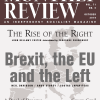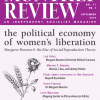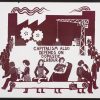
October 2019 (Volume 71, Number 5)
New issue of Monthly Review! If there is one thing that is clear about the economic situation in the mature capitalist economies, as we write these notes in mid-August 2019, it is that the financial world is increasingly running scared and looking for safe havens, worrying about the storm clouds ahead. There is now little doubt that the world economy is on the verge of a recession after a long sluggish recovery from the Great Financial Crisis of 2007-09. In itself this should not give occasion to surprise. In this instance, however, there lurks a bigger fear, the possibility of a financial Armageddon on the level of the Great Financial Crisis of 2008—or worse. | more…

The Rise of the Right
In an interview with Farooque Chowdhury, Monthly Review editor John Bellamy Foster speaks about the historical conditions associated with the rise of new far-right movements of a broadly neofascist character. What we are witnessing, especially in the advanced capitalist world, is the development of a neoliberal-neofascist alliance, reflecting the decline of the liberal-democratic state. Neofascism is the most dangerous and volatile phenomenon in this emerging right-wing historical bloc. All of this has to be seen in relation to the structural crisis of capitalism and growing ruling-class attempts to restructure the state-capital relationship so as to create regimes more exclusively for capital. | more…

Socialist Internationalism Against the European Union
Costas Lapavitsas’s The Left Case Against the EU (Polity, 2019) is recognized as the leading work advocating Lexit, the left-wing case for Brexit, and for nations leaving the European Union more generally. In light of current Conservative British Prime Minister Boris Johnson’s commitment to exit the European Union by October 31, even if it means a no-deal Brexit, the role of the left takes on growing importance. Moreover, this raises issues of the European Union generally, including the dominance of neoliberalism within it and the question of German hegemony. Here, Neil Davidson offers an assessment of Lapavitsas’s book. | more…

Navigating the Brexit Strait
In this continuation of the exchange on the European Union, the United Kingdom, and the left, Andy Storey engages with Costas Lapavitsas’s arguments in The Left Case Against the EU. | more…

Learning from Brexit
As part of the exchange on the European Union, the United Kingdom, and the left, Costas Lapavitsas provides an extensive response to Neil Davidson’s and Andy Storey’s contributions. | more…

Green Card
A new poem by Kenneth Salzmann, author of The Last Jazz and Other Poems. | more…

A Duel of Dreams
Naomi Klein’s The Battle for Paradise (Haymarket, 2018) describes a duel of dreams for post-Hurricane Mar’a Puerto Rico. On the one hand, networks of resistance and resilience sprang up around the island in the wake of the collapse of not just trees and houses, but infrastructure and government. On the other, a small group of super rich speculators and futurists were poised to cash in on what Puerto Rico’s then-Governor Ricardo Rossell—ó described as an opportunity to “sort of restart and upgrade” a nation he shamelessly called a “blank canvas.” Rossell—ó— was forced out of office on July 24, 2019, by mass protests, in large part thanks to the networks of resistance and resilience that came to life when the government essentially disappeared after the 2017 hurricanes. | more…

A New Revolutionary Subject
Monthly Review and Monthly Review Press author, world socialist activist, and theorist of revolution, Marta Harnecker, died on June 15, 2019, at age 82. In her memory, we republish an exchange between her and Greek journalist Tassos Tsakiroglou, conducted in advance of the 2017 conference on 150 Years of Marx’s Capital: Reflections for the Twenty-First Century. | more…

September 2019 (Volume 71, Number 4)
This special issue of Monthly Review honors the fiftieth anniversary this month of Margaret Benston’s landmark “The Political Economy of Women’s Liberation.” The essay sparked a revolution in Marxian thought, the full implications of which are only now being perceived in contemporary social reproduction theory. We have reprinted Benson’s pieces together with contributions by Silvia Federici, Martha E. Gimenez, Selma James (interviewed by Ron Augustin), Leith Mullings, Marge Piercy, and Lise Vogel, all of whom have played leading roles since the 1970s in the development of feminist historical materialism. | more…
%20%5BPDF%5D-100x100.jpg)
The Political Economy of Women’s Liberation
In sheer quantity, household labor, including child care, constitutes a huge amount of socially necessary production. Nevertheless, in a society based on commodity production, it is not usually considered “real work” since it is outside of trade and the market place. This assignment of household work as the function of a special category women means that this group does stand in a different relation to production than the group men. Except for the very rich, who can hire someone to do it, there is for most women, an irreducible minimum of necessary labor involved in caring for home, husband, and children. Household work remains a matter of private production. | more…

“She Was My Kind of Scientist”
In the late 1960s, the North American women’s liberation movement was reaching a highpoint of activity, its militancy complemented by a flourishing literature. This was the environment into which Margaret Benston’s 1969 Monthly Review essay, “The Political Economy of Women’s Liberation,” struck like a lightning bolt. At the time, many in the movement were describing women’s situation in terms of sociological roles, functions, and structures—reproduction, socialization, psychology, sexuality, and the like. In contrast, Benston proposed an analysis in Marxist terms of women’s unpaid labor in the family household. In this way, she definitively shifted the framework for discussion of women’s oppression onto the terrain of Marxist political economy. | more…

Women, Class, and Identity Politics
The question of the oppression of women, the critique of which constituted feminism as an academic and political pursuit, has been feminism’s enduring source of strength and appeal, yielding numerous critical theories and perspectives. This has produced continual conceptual shifts defining an evolving feminism, such as the shift from women to gender and from inequality to difference. It has also involved shifts from theorizing the general conditions of women’s experience—oppressed at home and in the workplace, while juggling the conflicting demands of both—to theorizing the implications of the claim that, while gender may be the main source of oppression for white, heterosexual, middle-class women, women with different characteristics and experiences are affected by other forms of oppression as well. A possible way for Marxist feminism to remain a distinctive theoretical and politically relevant perspective might be to return to class, in the Marxist sense, theoretically reexamining the relationship between class and oppression, particularly the oppression of working-class women, within capitalist social formations. | more…

On Margaret Benston
Margaret Benston’s “The Political Economy of Women’s Liberation” appears as both a return to the past and, at the same time, if not a “watershed,” as described by Peter Custers, certainly a new turn. On the one hand, she reiterated the classic Marxist-Leninist argument concerning the precapitalist, premarket character of domestic work. On the other, she so strongly insisted on the importance of this work for the stability and perpetuation of the capitalist system that she not only anticipated some of the theses later argued by theorists in the Wages for Housework Campaign, but often fell into apparent contradictions. | more…